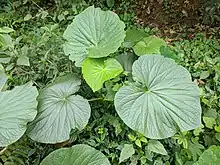Piper umbellatum
Pothomorphe umbellatum, or pariparoba, is a plant of Brazilian origin (atlantic wood)that has been traditionally used in folk remedies for digestive and liver-related maladies. In 2002, a research group based at the Tokyo Medical and Dental University[2] discovered antibacterial properties of the plant specific to Helicobacter pylori. Two years later in laboratory testing at the Pharmaceutical Sciences College (FCF) of the University of São Paulo, molecules found within the plant were demonstrated to have UVB-protective properties. For its medicinal and cosmetic promise, the Brazilian pharmaceutical company Natura obtained exclusive marketing rights to products developed from the plant.[3]
| Piper umbellatum | |
|---|---|
 | |
| Scientific classification | |
| Kingdom: | Plantae |
| Clade: | Tracheophytes |
| Clade: | Angiosperms |
| Clade: | Magnoliids |
| Order: | Piperales |
| Family: | Piperaceae |
| Genus: | Piper |
| Species: | P. umbellatum |
| Binomial name | |
| Piper umbellatum L. | |
| Synonyms[1] | |
| |
References
- "Piper umbellatum". Germplasm Resources Information Network (GRIN). Agricultural Research Service (ARS), United States Department of Agriculture (USDA). Retrieved 9 April 2017.
- Antibacterial Constituents against Helicobacter pylori of Brazilian Medicinal Plant, Pariparoba. Takahiko ISOBE, Ayumi OHSAKI and Kumiko NAGATA YAKUGAKU_ZASSHI vol: 122 issue: 4 page: 291-294 year: 2002 http://www.jstage.jst.go.jp/article/yakushi/122/4/122_291/_article/-char/en viewed 29 May 2007
- Protection for the skin, Extract from the Pariparoba exercises antioxidant action against the sun and should reach the market shortly, Dinorah Ereno Revista Pesquisa Fapesp, Print Edition November 2004, https://revistapesquisa.fapesp.br/en/2004/11/01/protection-for-the-skin/ viewed 31 Jul 2019
This article is issued from Wikipedia. The text is licensed under Creative Commons - Attribution - Sharealike. Additional terms may apply for the media files.